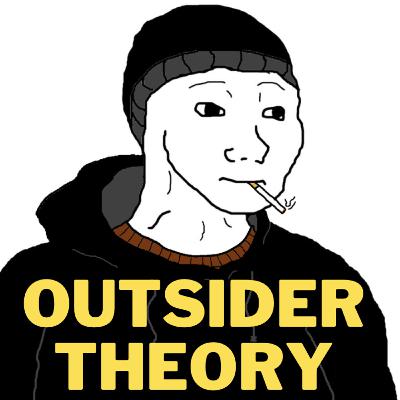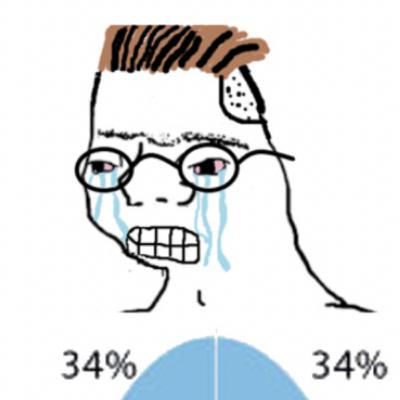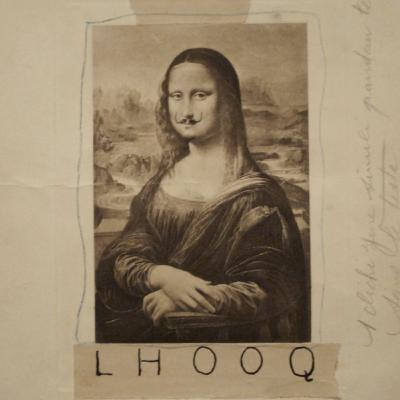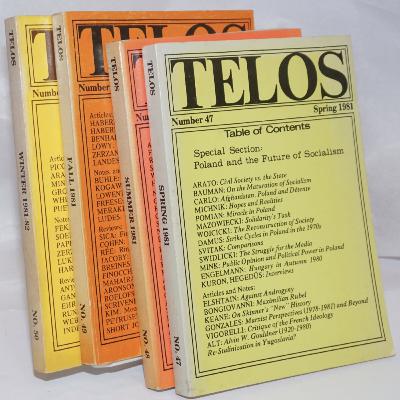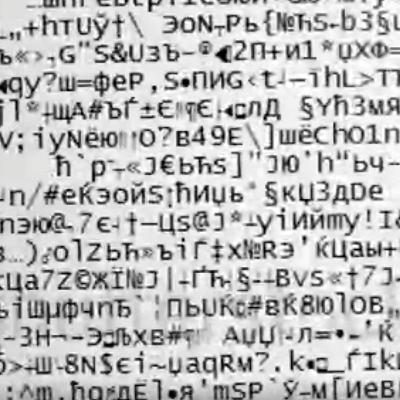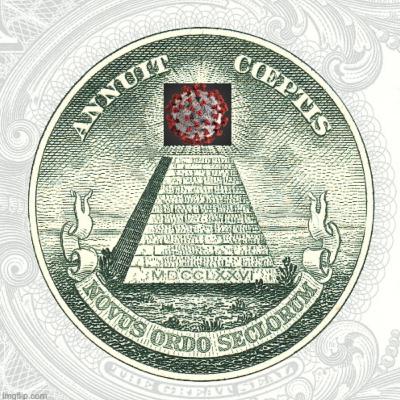Discover Outsider Theory
Outsider Theory

Outsider Theory
Author: Geoff Shullenberger
Subscribed: 106Played: 3,787Subscribe
Share
© 2025 Geoff Shullenberger
Description
Outsider Theory is an interview-based podcast exploring the mutations of theories outside of the authorized spaces of intellectual life as well as theories of that ever-alluring figure, the outsider, and related subjects.
49 Episodes
Reverse
Lockdown diaries became a literary fad in 2020, but few if any were memorable. What if the real literature of lockdown was written over a century ago? This is the hypothesis behind "The Machine Book of Weird," an anthology of fiction from the late 19th and early 20th century that explores isolation, domestic confinement, and the uncanniness of home. Publisher Tim Abrahams joins me to discuss this project, plus Freud, Mark Fisher, and more.
You can donate to the project's Kickstarter here: https://www.kickstarter.com/projects/mbow/machine-book-of-weird
In this special episode, guest host Daniel Hadas interviews Medical Nemesis on covid, Illich, industrialized medicine and thought, and more.
https://twitter.com/DanielHadas2
https://twitter.com/Medical_Nemesis
https://medicalnemesis.substack.com/
Matthew Crawford joins me to discuss his essay, "Was the Sexual Revolution a Government Psy-Op?," the politics of masturbation, Wilhelm Reich, the Frankfurt School, masculinity, the therapeutic state, and more.
https://unherd.com/2022/12/the-politics-of-masturbation/
https://mcrawford.substack.com/
Brian Chau returns to Outsider Theory to discuss ChatGPT's woke catechism.
https://cactus.substack.com/
Blaise Bayno (@urgurlblaise), former critical theory PhD student and co-organizer of the conference "Society Must Be Inoculated," joins me to discuss how critical theory became uncritical cheerleading for biopolitical authoritarianism, academic labor issues, the history of the UC Santa Cruz History of Consciousness program, and more.
Thomas and Brett from Psyop Cinema join me to discuss Hollywood and cultural engineering.
Psyop Cinema: https://www.spreaker.com/show/psyop-cinema
My Psyop Cinema episodes on Roland Emmerich:
https://www.spreaker.com/user/15144188/shullenberger-interview
https://www.spreaker.com/user/15144188/geoff-shullenberger-2
Brian Chau (Cactus Chu on Substack, @psychosort on Twitter) joins me to discuss institutions and why midwits rule them, decentralization, sorting mechanisms, right-wing aesthetics, Curtis Yarvin, William F. Buckley, and more.
https://cactus.substack.com/
https://www.tabletmag.com/sections/news/articles/rule-of-midwits
Jon Askonas joins me to discuss his ongoing series of essays in The New Atlantis, "Reality: A Post-Mortem."
Read the series here:
https://www.thenewatlantis.com/collections/reality-a-post-mortem
Essayist and poet Alice Gribbin joins me to discuss her recent essay in Tablet, "The Great Debasement," on the ideological transformation of museums and other cultural institutions into propaganda organs; the utilitarian attitude to art; the continued relevance of John Berger's "Ways of Seeing"; and more.
https://substack.com/profile/5192682-alice-gribbin
https://www.tabletmag.com/sections/arts-letters/articles/great-debasement-art
https://quillette.com/2021/06/05/the-artist-and-the-censor/
Tablet senior writer Jacob Siegel joins me to discuss the rightward trajectory of certain insights of Frankfurt School-derived critical theory, especially in light of the history of the journal Telos and its founder and editor, Paul Piccone. We also discuss Piccone's friend Paul Gottfried, the continued relevance of Herbert Marcuse's "Repressive Tolerance," the Thiel-affiliated New Right's cultivation of a counter-elite, the recent Vanity Fair profile of the Thielverse, and more.
Telos
http://www.telospress.com/
Jacob's work
https://www.tabletmag.com/sections/news/articles/elon-vs-obama
https://www.tabletmag.com/sections/news/articles/red-pill-prince-curtis-yarvin
https://www.tabletmag.com/sections/news/articles/spencer-gottfried-alt-right
https://manifesto.fireside.fm/
The Thielverse
https://www.vanityfair.com/news/2022/04/inside-the-new-right-where-peter-thiel-is-placing-his-biggest-bets
Marcuse's "Repressive Tolerance" and the right
https://outsidertheory.com/right-marcuseanism/
Writer and policy researcher Michael Cuenco joins me to discuss his recent American Affairs essay "'Victory is not Possible': a Theory of the Culture War," and two related essays on post-material politics and post-literate epistemology:
https://americanaffairsjournal.org/2022/02/victory-is-not-possible-a-theory-of-the-culture-war/
https://americanaffairsjournal.org/2021/05/immigration-and-citizenship-the-canadian-model-and-the-american-dream/
https://palladiummag.com/2021/04/17/americas-new-post-literate-epistemology/
Jacob Shell is Associate Professor of Geography at Temple University and the author of Giants of the Monsoon Forest: Living and Working with Elephants (2019) and Transportation and Revolt: Pigeons, Mules, Canals, and the Vanishing Geographies of Subversive Mobility (2015). He joins me to share his insights into the Canadian trucker convoy, the congealment of radical theories into stale academic orthodoxies and establishment aplogias, the blind spots of environmentalism, plus Ivan Illich, de-growth, elephants, and more.
https://liberalarts.temple.edu/academics/faculty/shell-jacob
https://twitter.com/JacobAShell
Sam Biagetti of Historiansplaining podcast joins me to discuss what's good, what's bad, and what's ugly in David Graber and David Wengrow's "The Dawn of Everything." We begin with an appreciative account of their dismantling of deterministic accounts of human social evolution, and then turn to a critical assessment of their theoretical assumption, their peculiar revisionist account of the Enlightenment, and their undervaluing of myth, ritual, and transcendence.
The Dawn of Everything: https://us.macmillan.com/books/9780374157357/thedawnofeverything
Listen to and support Historiansplaining here: https://www.patreon.com/user?u=5530632
Sam's cross-post of this episode has a useful list of other sources discussed: https://www.patreon.com/posts/dissecting-dawn-63996926
With the 2001 publication of Angels and Demons, Dan Brown shifted away from his early focus on the US security state and its post-Cold War identity crisis and introduced a new protagonist: Harvard professor of "Religious Symbology" Robert Langdon. This improbable hero's first two adventures transport him to the Old World and entangle him with a secretive institution far more ancient than the American deep state: the Roman Catholic Church. Curiously, the rise of Langdon signals Brown's turn away from the national security preoccupations of his early writing just as the 9/11 era brought the challenges facing the US state to the center of most people's attention. Despite its apparently obscure subject matter, 2003's The Da Vinci Code became a sensational hit – one of the bestselling novels of all time – and turned Brown's fictional avatar Langdon into a household name worldwide. Pseud Dionysius MPH joins me once again to try to make sense of Brown's success at forging a new, global anti-postmodern mythology just as the "end of history" consensus of the 1990s was beginning to fracture.
George Orwell's "The Road to Wigan Pier" begins as a report on life in the depressed coal and industrial region of Northern England and expands into an ambivalent critique of socialism and progress. It's a book that belongs to its era – which saw the Great Depression, the peak of industrialism in the capitalist core countries, the rise of both communist and fascist challenges to the interwar liberal order – but also speaks in interesting ways to ours. Angela Nagle returns to Outsider Theory for an appreciative discussion of Orwell's book and its relationship to her longstanding interests.
Follow Angela's Substack: https://angelanagle.substack.com/
Malcolm Kyeyune (@tinkzorg) joins me to map out the contours of class conflict today. Beginning with a discussion of the Canadian trucker convoy and other recent challenges to biomedical authoritarianism, we explore the managerial class's demand for ever-expanding intermediation (diversity consultants, localized public health bureaucracy, etc) in response to the spectral threats it confronts, from "fascism" to "misinformation." We also examine elite overproduction theory, the crisis of meritocratic ideology, the questionable prospects of the populist right, and much more.
Dan Brown is one of the best selling authors of all time; just fifteen years ago, "The Da Vinci Code" was a ubiquitous document of global popular culture. Yet Brown, now immensely wealthy from his novelistic success, is oddly neglected today. Pseud Dionysius MPH returns to the show to investigate the unlikely rise of Brown, his protagonist, Harvard Professor Robert Langdon, and the fictional discipline of "symbology" out of the demise of the cold war techno-thriller and the new threats of the information age. We explore Brown's two lesser known pre-Langdon novels, Digital Fortress and Deception Point, which despite being "bad" by most standards, are surprisingly prescient works that anticipate everything from Wikileaks to privatized space travel. We consider Brown's personal origins as a failson of the New England WASP elite who ultimately cashed in on his insider status as a popularizing mythologist of American power. His two early novels, we argue, clue us into the concerns underlying all of his fiction: the transformation of the "Cathedral" institutions of elite education and the Deep State in response to the post-Cold War dispensation of globalized and digitalized capitalism and feminized labor and the emergent risks of information warfare, extremism, and terrorism.
This is the first in a multi-part series that will examine the arc of Dan Brown's career and its implications.
Dr Benway returns to the show to discuss his extensive research on the vast oeuvre of Scientology founder L. Ron Hubbard, as well as William S. Burroughs's prolonged engagement with Hubbard's doctrines and practices and their odd resonances with post-structuralist thought. We examine both the genealogical and analogical relations between Hubbard's thinking and ideas developed in more respectable realms of 20th century ideological life, including psychoanalysis and Foucauldian theories of technologies of the self and technologies of power.
David Wills's "Scientologist!": https://www.google.com/books/edition/Scientologist/k9JtnQEACAAJ?hl=en
https://pioneerworks.org/broadcast/scientology-psychiatry
https://nonsite.org/the-first-privilege-walk/
@fitnessfeelingz posted a recent Twitter thread arguing that Covid is a modern myth:
https://threadreaderapp.com/thread/1465794640481857542.html
By this he means not that the pathogen SARS-COV-2 is not real, but that the existence of the pathogen does not account for its manifold social and political impacts. To make sense of these, we turn to René Girard's understanding of myth as a social technology that binds societies together in response to a common enemy. We consider how Covid-19 has come to perform this function, and why its limited efficacy in this regard only spurs more ritualized responses to it.
https://outsidertheory.com/girards-revelation/
https://www.washingtonexaminer.com/opinion/rene-girard-cancel-culture-and-the-logic-of-sacrifice
"[The pandemic] is a monetary event aimed at prolonging the lifespan of our finance-driven and terminally ill mode of production." This is the provocative thesis of Fabio Vighi, who joins me to discuss the series of recent articles for The Philosophical Salon where he elaborates this argument in full. He explains how Covid has served as a useful crisis, justifying unprecedented and indefinite "monetary doping," keeping finance capital afloat, and why the flipside of this largesse is the increasing regimentation of all facets of human life through digitized biopolitical control.
https://thephilosophicalsalon.com/the-central-bankers-long-covid-emergency-noise-and-conspiracys-best-kept-secret/
https://thephilosophicalsalon.com/a-self-fulfilling-prophecy-systemic-collapse-and-pandemic-simulation/
https://thephilosophicalsalon.com/slavoj-zizek-emergency-capitalism-and-the-capitulation-of-the-left/






